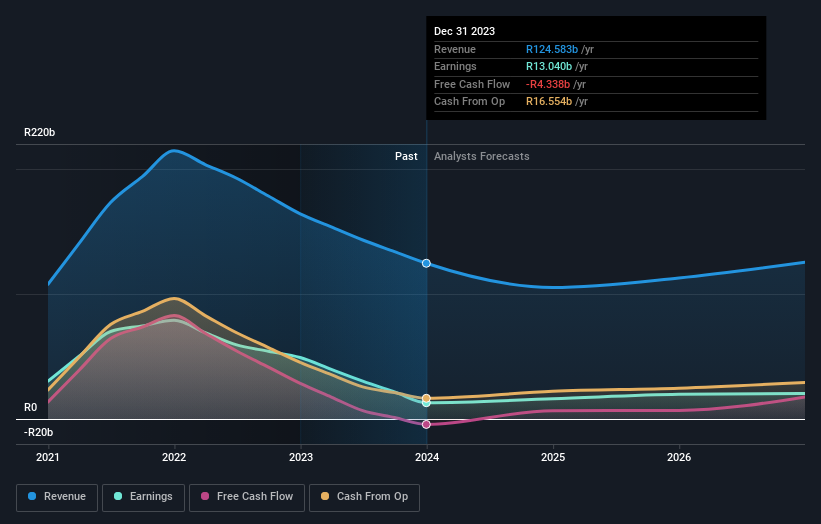Anglo American Platinum Limited's (JSE:AMS) stock price dropped 7.1% last week; public companies would not be happy
Key Insights
Significant control over Anglo American Platinum by public companies implies that the general public has more power to influence management and governance-related decisions
79% of the company is held by a single shareholder (Anglo American plc)
If you want to know who really controls Anglo American Platinum Limited (JSE:AMS), then you'll have to look at the makeup of its share registry. And the group that holds the biggest piece of the pie are public companies with 79% ownership. That is, the group stands to benefit the most if the stock rises (or lose the most if there is a downturn).
As a result, public companies as a group endured the highest losses last week after market cap fell by R14b.
Let's take a closer look to see what the different types of shareholders can tell us about Anglo American Platinum.
Check out our latest analysis for Anglo American Platinum
What Does The Institutional Ownership Tell Us About Anglo American Platinum?
Many institutions measure their performance against an index that approximates the local market. So they usually pay more attention to companies that are included in major indices.
As you can see, institutional investors have a fair amount of stake in Anglo American Platinum. This can indicate that the company has a certain degree of credibility in the investment community. However, it is best to be wary of relying on the supposed validation that comes with institutional investors. They too, get it wrong sometimes. When multiple institutions own a stock, there's always a risk that they are in a 'crowded trade'. When such a trade goes wrong, multiple parties may compete to sell stock fast. This risk is higher in a company without a history of growth. You can see Anglo American Platinum's historic earnings and revenue below, but keep in mind there's always more to the story.
We note that hedge funds don't have a meaningful investment in Anglo American Platinum. Anglo American plc is currently the largest shareholder, with 79% of shares outstanding. This implies that they have majority interest control of the future of the company. The Vanguard Group, Inc. is the second largest shareholder owning 0.9% of common stock, and BlackRock, Inc. holds about 0.7% of the company stock.
While studying institutional ownership for a company can add value to your research, it is also a good practice to research analyst recommendations to get a deeper understand of a stock's expected performance. There are plenty of analysts covering the stock, so it might be worth seeing what they are forecasting, too.
Insider Ownership Of Anglo American Platinum
The definition of company insiders can be subjective and does vary between jurisdictions. Our data reflects individual insiders, capturing board members at the very least. Company management run the business, but the CEO will answer to the board, even if he or she is a member of it.
Most consider insider ownership a positive because it can indicate the board is well aligned with other shareholders. However, on some occasions too much power is concentrated within this group.
Our information suggests that Anglo American Platinum Limited insiders own under 1% of the company. It is a very large company, so it would be surprising to see insiders own a large proportion of the company. Though their holding amounts to less than 1%, we can see that board members collectively own R8.4m worth of shares (at current prices). It is always good to see at least some insider ownership, but it might be worth checking if those insiders have been selling.
General Public Ownership
With a 14% ownership, the general public, mostly comprising of individual investors, have some degree of sway over Anglo American Platinum. While this group can't necessarily call the shots, it can certainly have a real influence on how the company is run.
Public Company Ownership
It appears to us that public companies own 79% of Anglo American Platinum. This may be a strategic interest and the two companies may have related business interests. It could be that they have de-merged. This holding is probably worth investigating further.
Next Steps:
While it is well worth considering the different groups that own a company, there are other factors that are even more important. For example, we've discovered 3 warning signs for Anglo American Platinum (1 makes us a bit uncomfortable!) that you should be aware of before investing here.
If you would prefer discover what analysts are predicting in terms of future growth, do not miss this free report on analyst forecasts.
NB: Figures in this article are calculated using data from the last twelve months, which refer to the 12-month period ending on the last date of the month the financial statement is dated. This may not be consistent with full year annual report figures.
Have feedback on this article? Concerned about the content? Get in touch with us directly. Alternatively, email editorial-team (at) simplywallst.com.
This article by Simply Wall St is general in nature. We provide commentary based on historical data and analyst forecasts only using an unbiased methodology and our articles are not intended to be financial advice. It does not constitute a recommendation to buy or sell any stock, and does not take account of your objectives, or your financial situation. We aim to bring you long-term focused analysis driven by fundamental data. Note that our analysis may not factor in the latest price-sensitive company announcements or qualitative material. Simply Wall St has no position in any stocks mentioned.

 Yahoo Finance
Yahoo Finance 

